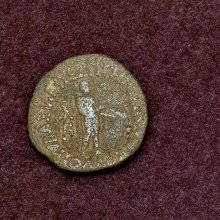Kushan: 1 definition
Introduction:
Kushan means something in the history of ancient India. If you want to know the exact meaning, history, etymology or English translation of this term then check out the descriptions on this page. Add your comment or reference to a book if you want to contribute to this summary article.
Images (photo gallery)
(+3 more images available)
India history and geography
Source: Wikipedia: India HistoryThe Kushan Empire spread to encompass much of Afghanistan, present-day Pakistan and then the northern parts of India at least as far as Saketa and Sarnath near Varanasi (Benares), where inscriptions have been found dating to the era of the Kushan Emperor Kanishka the Great. Kanishka was a great patron of Buddhism; however, as Kushans expanded southward toward the Indian subcontinent the deities of their later coinage came to reflect its new Hindu majority.
The Kushans inherited the Greco-Buddhist traditions of the Indo-Greek Kingdom they replaced, and their patronage of Buddhist institutions allowed them to grow as a commercial power. Between the mid-1st century and the mid-3rd century, Buddhism, patronized by the Kushans, extended to China and other Asian countries through the Silk Road.

The history of India traces the identification of countries, villages, towns and other regions of India, as well as mythology, zoology, royal dynasties, rulers, tribes, local festivities and traditions and regional languages. Ancient India enjoyed religious freedom and encourages the path of Dharma, a concept common to Buddhism, Hinduism, and Jainism.
See also (Relevant definitions)
Starts with: Kushana, Kushanabha, Kushanagara, Kushanaman, Kushanara, Kushanda, Kushandi, Kushandika, Kushanetra, Kushang, Kushanguli, Kushanguriya, Kushanguriyaka, Kushanku, Kushankura.
Full-text (+55): Mathura, Buxar, Kumrahar, Kankandighi, Sanghol, Mochpal, Pakurtala, Sarberia, Ropar, Mason, Jushkapura, Bahiri, Harishpur, Kaushambi, Ahicchatra, Rajghat, Purana Qila, Jatar Deul, Noh, Sonkh.
Relevant text
Search found 10 books and stories containing Kushan; (plurals include: Kushans). You can also click to the full overview containing English textual excerpts. Below are direct links for the most relevant articles:
Stupas in Orissa (Study) (by Meenakshi Chauley)
During the Kushana Period < [Chapter 2]
Dharmarajika Stupa < [Chapter 3]
Puppetry in Assam (by Gitali Saikia)
Folk Theatre (d): Kushangan < [Chapter 6]
Puppetry and Folk Dramas of Assam < [Chapter 6]
Temples of Munnur (Historical Study) (by R. Muthuraman)
The Great Buddhist Emperors of Asia (by Shibani Dutta)
Chapter 2c - Kanishka as a Buddhist King (Circa 78 A.C.–101 A.C.)
Chapter 2d - Harshavardhana, the King of Uttarapatha (590 A.C.–647 A.C.)
Rambling Thoughts on the Indian Art and < [April – June, 2008]
Expansion of the Gupta Empire < [May-June, 1929]
Expansion of the Gupta Empire < [July-August, 1929]
Vietnamese Buddhist Art (by Nguyen Ngoc Vinh)
1. The evolution of Buddhist Art (Introduction) < [Chapter 1 - The evolution of Buddhist Art in South Vietnam and South East Asia]
1. Sculptures in Champa < [Chapter 4 - The Sculpture and its Reciprocal Influence]
Related products






